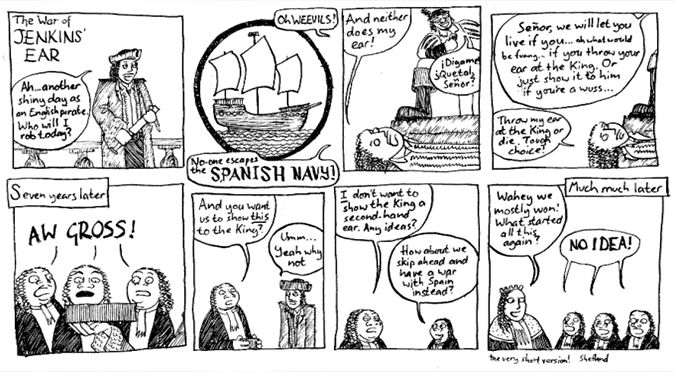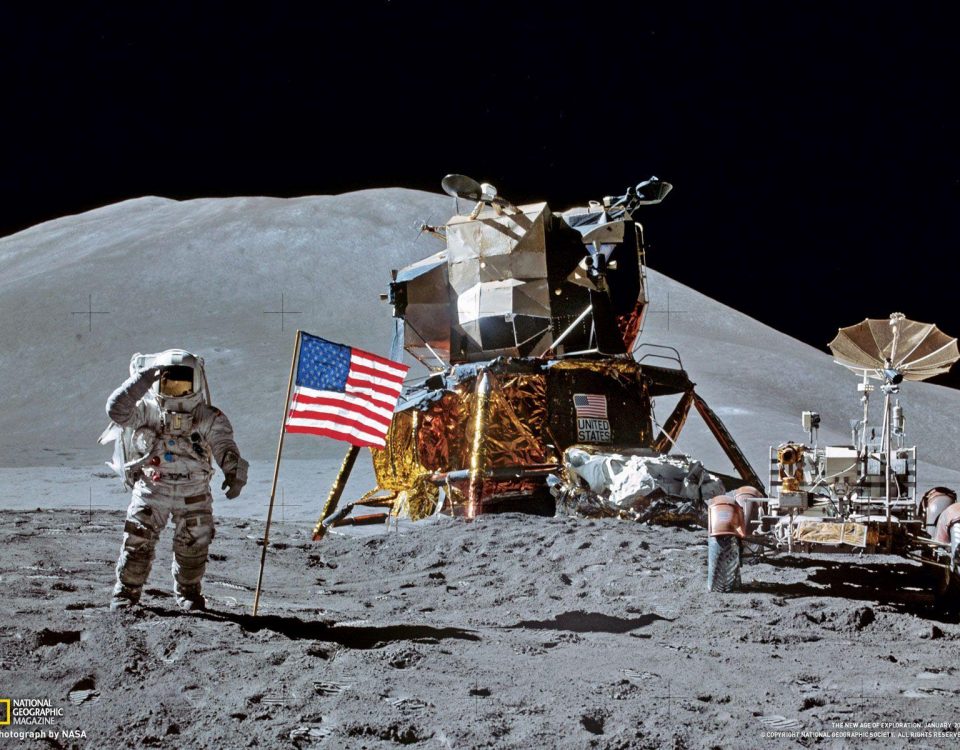
13 OF THE WORST ECOLOGICAL DISASTERS OF ALL TIME
April 22, 2014
HISTORIC FAILURES (that we should’ve learned from by now…)
June 30, 2014The War of Jenkins’ Ear 1739-1748
The War for Jenkins’ Ear was a conflict as absurd as it sounds.
To sum it up – this entire war (between England and Spain), which cost the lives of almost 25,000, was sparked due to an incident involving the loss of an ear that belonged to Captain Robert Jenkins.
Yup, that’s right, his ear.
Of all the petty excuses to engage in a large-scale bout of fisticuffs, that has got to be the single dumbest one I have ever heard, and that’s saying something! (for reference see: any random article on this site)
It all started following the War of the Spanish Succession after the terms were agreed to in 1731 with the Treaty of Utrecht. England and Spain made a 30 year trade agreement that allowed British ships to trade 500 tons of goods in the Spanish colonies. Britain granted the Spanish navy the right to stop and search their ships. Like paranoid highway patrol officers searching for contraband drugs, some of the Spaniards were kinda jerks about it.

“Evening officer! No that’s not what it smells like…”
Turns out the Spanish were right to be suspicious, seeing as they were in fact hiring pirates to smuggle goods across the sea!
But one particular search went a little too far…
 On the 9th of April, 1731, a merchant vessel, the Rebecca, under the command of Cap’n Jenkins was stopped by the Spanish coast guard off the coast of Cuba on their way from Jamaica. The Havana Captain of La Isabela, Julio León Fandiño, was apparently having a really bad day and decided to take it out on poor ole’ Jenkins… (and his ear). The Spaniards raided the British brig in search of illegal goods, looted their treasure, plundered their provisions, tortured the crew, and threatened to set the ship on fire.
On the 9th of April, 1731, a merchant vessel, the Rebecca, under the command of Cap’n Jenkins was stopped by the Spanish coast guard off the coast of Cuba on their way from Jamaica. The Havana Captain of La Isabela, Julio León Fandiño, was apparently having a really bad day and decided to take it out on poor ole’ Jenkins… (and his ear). The Spaniards raided the British brig in search of illegal goods, looted their treasure, plundered their provisions, tortured the crew, and threatened to set the ship on fire.
If that’s not enough, they then tied poor Captain Jenkins to the mast and left them with a ‘warning’. According to Jenkins report, the Spanish Captain: “took hold of his left Ear and with his Cutlass slit it down, and then another of the Spaniards took hold of it and tore it off, but gave him the Piece of his Ear again.“
Jenkins was then supposedly told the same would happen to King George if he were caught smuggling again, but for all we know he may have heard him wrong, seeing as he’d just had his ear lobbed off and all.
8 years later, Robert Jenkins was still complaining about his ear to anyone who would listen. The obsessive grudge-holding sailor somehow managed to preserve his severed ear in a bottle of whine and carried it around wherever he went. Meanwhile, as tensions increased between England and Spain, the war doves convinced Bob to bring his pickled ear before Parliament and gross them all out while he theatrically reenacted his tale of woe.

Jenkins showing off his gross old severed ear…
The British Prime Minister, Sir Robert Walpole, was reluctant to engage in yet another conflict, but officially declared war on October 23, 1739. The Spanish King, Phillip the Fifth, suspended the treaty and began confiscating British ships in Spanish ports. British troops were sent into Gibraltar, a fleet was dispatched to the West Indies, and on November 20, 1739, six ships of the line, under the command of Vice Admiral Edward Vernon, attacked Porto Bello, Panama and were met with little resistance.
Vice Admiral Vernon’s success at Panama was followed up by his greatest failure at the battle of Cartagena de Indias in 1741, where Vernon’s 186 ships were embarrassingly decimated by Don Blas de Lezo, a Spanish Admiral armed with only six ships, not to mention one-eye, one-arm, and one-leg!

At least he still had both ears…?
The war was also waged along the Florida-Georgia border (pre-Gators/Bulldogs rivalry)
Florida was a Spanish territory first established by Ponce De Leon in 1513 (while allegedly seeking the Fountain of Youth). Georgia was a newly established British penal colony, just north of Florida, where they often shipped debtors and convicts alike. During the War for Jenkins’ Ear, Georgian Governor James Oglethorpe led a failed attempt to take the heavily fortified Spanish city of Saint Augustine, Florida. In response, St. Augustine’s governor, Manuel Monteano led an attack against St. Simon’s Island in 1742, also unsuccessfully. The resulting Battle of Bloody Marsh was over in a matter of hours.
A few skirmishes later and the war was over in 1748.
Considering this war is barely a footnote in most history text books, it did have profound effects on the world at large. Most notably, this was the pivotal moment where the British Empire became the most powerful nation in the world, surpassing the might of the Spanish fleet that had dominated the world’s oceans since the discovery of the Americas.
 Ultimately the petty squabble that became the War for Jenkins’ Ear devolved into a European-wide conflict known as the War for the Austrian Succession in 1742 when Spain and England both took opposing sides of the conflict, which directly led to the Seven Years War (1756-1763) and its North American spin-off: the French/Indian War. The aftermath of the French and Indian War caused Great Britain to raise taxes on the Yankee Colonists… and we all know how that went down. The rest is American history…
Ultimately the petty squabble that became the War for Jenkins’ Ear devolved into a European-wide conflict known as the War for the Austrian Succession in 1742 when Spain and England both took opposing sides of the conflict, which directly led to the Seven Years War (1756-1763) and its North American spin-off: the French/Indian War. The aftermath of the French and Indian War caused Great Britain to raise taxes on the Yankee Colonists… and we all know how that went down. The rest is American history…
These factors also resulted in The (first) French Revolution and the subsequent rise of Napoleon. So if you were (hypothetically) desperately writing an essay on the factors that led to colonial independence, you could argue that the entire American Revolution was the result of one man’s lost ear.
In fact, there’s probably an alternate universe in which Jenkins never lost his ear, the United States was never formed, Napoleon conquered Mexico, somehow leading to the eventual takeover of the Soviet Union, right before intelligent apes waged war against mankind, and my goatee-sporting, eye-patch-wearing, mirror-universe twin is the last sane skeptic alive, cursed to wander the scorched nuclear wastelands of an endless desert, and blog about how things went so very wrong…
So in closing: the entire space-time-continuum rests on the fate of one man’s ear, probably.
Thank you Captain Jenkins… and sorry bout the ear bro.
Erik Slader
Hope you enjoyed this edition of “Epik Fails of History!”, if you have any comments, questions, concerns, or suggestions let me know in the comments below! Also, be sure to Like us on Facebook, or Follow me on Twitter, and SHARE IT with your friends!
 —– More articles on Historic Failure:
—– More articles on Historic Failure:
The Mongol Invasion(s) of Japan
Y2K – A Day That Shall Live In Mockery
—Sources:
http://www.georgiaencyclopedia.org/articles/history-archaeology/war-jenkins-ear
http://militaryhistory.about.com/od/battleswars16011800/p/jenkinsear.htm
http://history.howstuffworks.com/history-vs-myth/jenkins-ear.htm
http://en.wikipedia.org/wiki/Robert_Jenkins_(master_mariner)
http://www.bbc.co.uk/history/historic_figures/walpole_robert.shtml
http://www.infoplease.com/encyclopedia/history/jenkins-ear-war-of.html
http://americanhistory.about.com/od/colonialamerica/a/King-Georges-War.htm
http://en.wikipedia.org/wiki/War_of_Jenkins’_Ear
http://www.heritage-history.com/www/heritage.php?Dir=wars&FileName=wars_austriasuccess.php
http://www.history.com/this-day-in-history/the-seven-years-war-begins
http://www.cracked.com/article_17123_the-5-most-retarded-wars-ever-fought_p2.html






16 Comments
[…] Not to mention they’d been fighting wars nonstop since like the 1300’s: Wars for Empire, King George’s War, King William’s War, Queen Anne’s War, War for the Spanish Succession, the War for the Austrian Succession, the French/Indian War, the Seven Years War, the Nine Years War, the Thirty Years War, the 80 Years War, The Hundred Years War, and… the War for Jenkins Ear?! […]
Great story! Oh wait, it’s not really fiction, is it?
Also, it’s kinda ironic that Florida, that place where American people go to play golf and die, was once a candidate for the fountain of youth;)
Haha yeah, Florida is unfortunately kinda stuck with that stereotype (which happens to be mostly true). I actually live in Jacksonville, Florida – a 30 minute drive away from Saint Augustine (the oldest city of America) where Ponce De Leon landed, claimed the continent for Spain, and pissed off a bunch of natives.
If you think of the USA as “America”, you miss the fact the city of Mexico is not in Asia or on Mars and it existed long before any European arrived to America. And Mexico is only one of the many other cities exisiting before 1492.
Think about the Incas, the greatest empire on Earth until the Russians conquered Siberia. They lived in cities with houses made with stone, not in tipis like the Sioux, moving after the buffalos.
Oh I agree. As someone from the states, I have a bad habit of referring to the USA as America lol
The Incan and Aztec Empires were absolutely impressive, and worthy of note. What the European colonists and Spanish Conquistadors did was beyond horrible, and it’s tragic that so much history has been erased and whitewashed.
I also feel the need to point out this is one of my earlier articles, so it’s a little less polished than some of my newer content. We’re actually planning on revisiting this topic on an upcoming episode of the Epik Fails of History podcast!
[…] THE WAR FOR JENKINS’ …EAR?! […]
[…] THE WAR OF… JENKIN’S EAR?! […]
[…] THE WAR FOR… JENKIN’S EAR?! […]
[…] THE WAR FOR JENKINS’ …EAR?! […]
[…] THE WAR FOR… JENKINS’ EAR?! […]
[…] of inspiration. Usually it’s a title, but sometimes it’s much more vague. Example: “The War of Jenkins’ Ear” sounded ridiculous, so I knew I had to cover it at some point. It always begins with an ‘Epic […]
The Rebecca was a merchant vesset, not a Royal Navy ship (hence, not HMS). Ther is no proof that Jenkins (a Welshman) appeared before parliament. “Julio León Fandiño” was actually “Juan de León Fandiño”. Spanish coastguards were actually glorified privateers. León Fandiño was later captured with his boat by Captain Thomas Frankland RN and imprisoned in England. Vernon’s attack on Cartagena involved besieging one of the most heavily fortified cities in America. While Lezo sank his own ships, Vernon comprehensively destroyed all the forts in his possession before withdrawing, leaving the port open to future attack. 20 years later, the British besieged and captured the tougher nut of Havana (1762). Actually the much more successful (from the British point of view) Seven Years War had a far greater influence on subsequent events, including the movement towards US independence.
Wow, that’s awesome. Thank you for the reply! I’ll definitely delve back into this subject some more at some point. 🙂
Briere started out laughing anytime recalling all their game against the other person in January if your Senators ended up in San francisco to experience the Exuberance.
This is to funny. Robert Jenkins is my ancestor.
Woah, that’s awesome! 😀